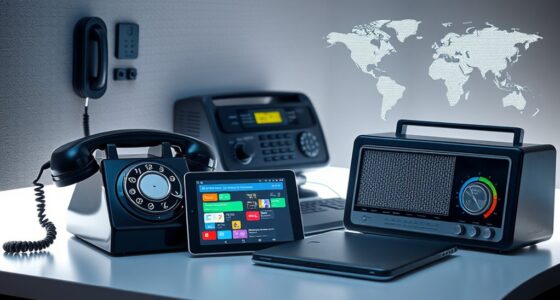Deaf entrepreneurs bring unique insights that can transform your approach to business. Focus on your passions and values while conducting thorough market research to understand community needs. Embrace accessible communication tools and attend Deaf-focused networking events to build connections. Remember to share your stories; genuine interactions help foster relationships. By incorporating innovative flavors and sustainable sourcing in your offerings, you’ll appeal to health-conscious consumers. Discover more tips that can spark your entrepreneurial journey.
Key Takeaways
- Develop a strong business idea that aligns with your passions and values to ensure lasting commitment and success.
- Explore funding options, including government programs, to support your entrepreneurial journey and financial growth.
- Incorporate accessible communication tools and sign language in operations to enhance inclusivity and customer engagement.
- Attend Deaf-focused networking events to build connections and foster community within the Deaf entrepreneur ecosystem.
- Share personal stories and experiences to create genuine interactions, inspiring others in the Deaf community.
Deaf Entrepreneurs’ Unique Insights

As a Deaf entrepreneur in the gourmet vegan food industry, you likely have a unique perspective on current trends and consumer preferences. Your insights can help shape innovative dishes that cater to a growing market focused on health and sustainability. For instance, incorporating indigenous ingredients like cassava into your dishes can enhance flavors while promoting cultural appreciation. Additionally, sharing your experiences not only highlights your creativity but also connects you with a community enthusiastic for fresh ideas and encourages diversification in investments as a strategy for long-term success. By showcasing your success, you contribute to the importance of Deaf awareness and inspire others in the Deaf community to pursue their entrepreneurial dreams. Moreover, a focus on a balanced diet can further emphasize the health aspects of your gourmet offerings, appealing to health-conscious consumers. Implementing evidence-based strategies in your menu design may also help ensure that your dishes meet the nutritional needs of your clientele.
Gourmet Vegan Food Trends
While the gourmet vegan food scene continues to evolve, Deaf entrepreneurs are stepping up with unique insights that reshape the industry. You’ll notice a shift toward innovative plant-based products focusing on enhanced nutritional profiles and celebrating the unique qualities of ingredients. Enhanced nutritional profiles are becoming increasingly important as consumers demand healthier options that appeal to health-conscious individuals. Additionally, many are incorporating chia seeds’ health advantages to boost the nutritional value of their offerings. Chia seeds, known for their high fiber content, can help support gut health and promote satiety. Moreover, incorporating ingredients like baked kale’s nutrients can further enhance the health benefits of vegan dishes. Sustainable sourcing is becoming a priority, reducing environmental impact while making vegan options more luxurious and accessible. Furthermore, many entrepreneurs are exploring meal replacement juices that offer essential nutrients while promoting weight loss and overall wellness.
Expect to see plant protein innovations that don’t rely on powders, along with budget-friendly staples like lentils and tofu. Convenient shelf-stable snacks and Asian-inspired vegan dishes are gaining traction too.
Vibrant Urban Centers

In vibrant urban centers, thriving Deaf communities play an essential role in creating inclusive spaces. You’ll find underrated local eateries that not only serve delicious food but also foster connections among diverse groups. Plus, using visual communication tools enhances interaction, making these environments even more accessible and engaging for everyone. Robust flow of people is crucial in ensuring these spaces remain lively and full of activity. Engaging in creative practices can enhance problem-solving and bring innovative ideas to these community hubs. Additionally, many of these communities benefit from portable power solutions that help support local businesses and events, creating a more dynamic atmosphere.
Thriving Deaf Communities
Thriving Deaf communities in vibrant urban centers showcase the power of inclusivity and cultural richness. You’ll find that Deaf Urbanism and DeafSpace principles enhance accessibility, creating environments where everyone can navigate easily. In cities like Washington, D.C., Deaf individuals gather to socialize and access services tailored to their needs. Supporting Deaf-owned businesses not only drives economic empowerment but also fosters innovation, as these entrepreneurs bring unique perspectives to the marketplace. This entrepreneurial mindset, characterized by continuous learning, is vital for adapting to challenges and driving success. The cultural contributions of Deaf communities—like artistic expressions and events—enrich urban life, making it more vibrant. Home and heritage play crucial roles in enhancing overall well-being, particularly for seniors in these communities. Zoning laws that dictate permissible locations for tiny houses can also inform community planning to ensure inclusivity for diverse populations. Home improvement strategies that prioritize accessibility and safety are essential in ensuring that all community members can thrive. This emphasis on inclusive and accessible urbanism helps eliminate ableism and fosters a sense of belonging for all.
Underrated Local Eateries
Hidden culinary treasures await discovery in vibrant urban centers across the country. From Detroit to Durham, these underrated eateries serve incredible dishes that deserve your attention. Explore diverse flavors and support local chefs who pour their passion into every plate. Asheville, North Carolina is known for its vibrant food scene, making it a must-visit destination for food enthusiasts seeking unique dining experiences. Additionally, many local eateries prioritize ethical sourcing, reflecting a growing trend among consumers who value sustainable practices. Many of these restaurants also emphasize global culinary delights, offering a taste of international flavors that can inspire your cooking journey. In line with the shift towards sustainable fashion, these eateries often use locally sourced ingredients to create delicious, eco-friendly meals. You might even find sweet treats like Dirt Cups that could be a hit at your next gathering!
| City | Notable Eateries |
|---|---|
| Detroit, MI | Buddy’s, Cedar Garden, Honey Bee La Colmena |
| Durham, NC | Dame’s Chicken & Waffles, Yamazushi |
| El Paso, TX | Chico’s Tacos, Tabla, Salma Farah’s |
| Greenville, SC | Local breweries, farm-to-table spots |
| Pittsburgh, PA | Gi-Jin, Gaucho Parrilla, Pamela’s |
Don’t miss out on these local gems. Each bite tells a story, and supporting them strengthens your community. Immerse yourself and savor the flavors!
Use Visual Communication Tools
How can visual communication tools transform your business interactions in vibrant urban centers?
By leveraging video conferencing platforms like Zoom and Skype, you can engage with customers and partners using sign language interpreters or captioning services. Text-based communication via social media and email enhances your marketing efforts. Visual aids like charts, graphs, and 3D models help convey complex ideas clearly, making your presentations more effective. Additionally, utilizing best lifestyle products can enhance your workflow and overall efficiency. A breakfast that is high in nutrients can boost your energy levels, which is essential for productive business interactions. Hiring interpreters for meetings guarantees everyone understands. Utilizing automation’s role can streamline your data processing, enabling real-time decision-making that enhances customer engagement. Furthermore, incorporating personalized learning strategies can improve team collaboration and skills development. Utilize digital marketplaces to reach a diverse customer base, while online resources offer valuable training. Assistive technologies for productivity, such as speech-to-text software, boost productivity in meetings.
Artisanal Coffee Shops

When you think about artisanal coffee shops, consider how innovative flavor combinations can elevate the coffee experience. You can also explore partnerships with craft distilleries and vineyards to offer unique beverage pairings. Plus, hosting culinary workshops and tastings not only showcases your offerings but also fosters community engagement. Additionally, Fingertalk’s focus on connecting the deaf community with the hearing community through its cafes highlights the importance of inclusive business practices.
Chef’s Innovative Flavor Combinations
Artisanal coffee shops thrive on creativity, and one of the most exciting aspects is their innovative flavor combinations.
You can experiment with unique coffee blends by sourcing beans from different regions, enhancing profiles through various roasting techniques. Incorporating local ingredients not only adds distinct flavors but also supports your community’s economy. Additionally, the Deaf-run coffee shop opening in Cape Town exemplifies how businesses can create inclusive environments through unique offerings.
Seasonal offerings keep your menu fresh and enticing, drawing in curious customers enthusiastic to try something new. Gathering and acting on customer feedback helps refine your blends over time, ensuring you meet their tastes.
Craft Distilleries and Vineyards
While craft distilleries and vineyards share a commitment to quality and innovation, they each bring unique flavors and experiences to the table.
If you’re considering diving into this industry, focus on honing your craft and understanding the local market. With the U.S. craft spirits market valued at $7.8 billion in 2023, there’s room for growth. The total number of active craft distillers reached 3,069 distillers in 2023, showcasing a thriving community, despite some volume decline. Embrace regional trends and the challenges of market competition, just like vineyards that innovate through unique blends.
Establishing strong local connections and understanding regulations will set your venture apart. Remember, your passion for quality will resonate with customers and help you build a loyal following.
Culinary Workshops and Tastings
Building on the innovation seen in craft distilleries and vineyards, culinary workshops and tastings in artisanal coffee shops offer an exciting way to engage consumers. These hands-on experiences allow you to explore unique coffee flavors while learning about sustainable sourcing and brewing methods. By hosting workshops, you not only diversify your revenue but also enhance customer loyalty as participants develop a deeper appreciation for your products. Plus, these events can serve as powerful brand promotion tools, helping you connect with the community and attract new customers. As coffee enthusiasts gather, you create a vibrant space that fosters relationships and shares knowledge, ultimately positioning your shop as a go-to destination for exceptional coffee experiences. With the US coffee shop market projected to reach $80 billion in 2024, the potential for growth through these engaging experiences is significant.
Must-See Sights

As a Deaf entrepreneur, exploring must-see sights can be both inspiring and enriching for your journey. Historic Deaf heritage sites, breathtaking national parks, and Deaf art exhibitions offer unique perspectives and creative stimulation. Engaging with visual storytelling at these venues can deepen your connection to the community and fuel your entrepreneurial spirit. Embracing unique perspectives allows you to gain insights that can enhance your business approach and foster connections with others in the Deaf community.
Historic Deaf Heritage Sites
If you’re looking to explore the rich history and culture of the Deaf community, visiting historic Deaf heritage sites is a must.
Start with the Martha’s Vineyard Shared-Signed Language Community Auto Tour, where you can discover essential sites like Lambert’s Cove and Abel’s Hill Cemetery. Deaf residents were integrated into the community’s social, political, and economic life, showcasing a unique cultural identity.
Don’t miss the Chilmark Public Library, which houses valuable digital archives.
If you’re traveling in Europe, check out the Danish Deaf History Society and the Finnish Museum of the Deaf for deeper insights into Deaf culture.
Many of these sites offer Deaf-friendly tourism initiatives, including sign language guides and interactive displays.
Engaging with these locations will enhance your understanding and appreciation of Deaf heritage, making your visit truly memorable.
Breathtaking National Parks
Exploring the rich tapestry of Deaf heritage can inspire a deeper appreciation for nature, leading you to some of the most breathtaking national parks in the U.S.
Start with Great Smoky Mountains National Park, where over 13 million visitors revel in its stunning biodiversity and scenic trails. This park is also known for its 3% increase in visitors over the previous year.
The Grand Canyon, with its vast landscapes, captivates 4.7 million adventurers each year.
Don’t miss Zion National Park for its steep cliffs and canyons, or Yellowstone for its iconic geothermal wonders like Old Faithful.
Rocky Mountain National Park offers striking mountain vistas, while Yosemite’s granite cliffs and waterfalls dazzle 3.8 million visitors.
Each park showcases unique beauty, inviting you to connect with nature and embrace the outdoors.
Deaf Art Exhibitions and Festivals
Art has a unique way of bridging gaps and fostering connection, and Deaf art exhibitions and festivals do just that by celebrating the vibrant creativity of the Deaf community.
You’ll find incredible events like the Deaf Visual Arts Festival in St. Louis, where 20-40 artists showcase their work. Organizations like Deaf Spotlight in Seattle promote Deaf, DeafBlind, and Hard of Hearing artists through exhibitions and educational workshops. The festival is set to take place at the St. Louis Community College Florissant Valley and aims to increase visibility for deaf artists.
Festivals such as the Toronto International Deaf Film and Arts Festival offer immersive experiences that enhance understanding of Deaf culture. Plus, virtual exhibitions make art accessible to everyone.
Attending these events not only supports artists but also deepens your appreciation for the rich tapestry of Deaf culture and creativity.
Visual Storytelling Enhances Engagement
When you engage with visual storytelling in Deaf culture, you tap into a rich tradition that not only captivates but also connects communities. Through expressive sign language and visual vernacular, you create narratives that resonate emotionally, making your stories unforgettable. This form of storytelling fosters belonging, much like being in a Deaf club, and encourages community engagement. Skilled storytellers serve as role models, shaping the identities of young Deaf individuals. Storytelling serves as a cultural glue that defines societies, further emphasizing its importance in the Deaf community.
With technology, you can enhance accessibility and reach a broader audience, breaking down communication barriers. Real-time platforms, like Deaf Stories LIVE, elevate interaction, while digital tools preserve cultural narratives. Embrace visual storytelling to strengthen connections and celebrate the beauty of Deaf culture in your entrepreneurial journey.
Practical Tips

When you’re planning your business journey, knowing the practical aspects can make all the difference. Think about how you’ll get there and get around, the best time to visit potential markets, and where you’ll stay. Understanding local etiquette can also help you build stronger connections within the community. Additionally, being aware of communication barriers can help you prepare for any challenges you may face when interacting with potential clients and partners.
Getting There
To achieve your entrepreneurial dreams, careful planning and preparation are essential. Start by developing a strong business idea that aligns with your passions and values. Use tools like the Business Model Canvas to create a detailed business plan.
Explore various funding options, including government programs, to support your venture. Conduct thorough market research to understand the needs of the Deaf community and tailor your offerings accordingly. Recognizing and addressing communication barriers can unlock substantial consumer potential, enhancing your overall business strategy.
Incorporate accessible communication tools and sign language in your operations to enhance customer satisfaction. Attend Deaf-focused networking events to build valuable connections.
Foster an inclusive workplace by recruiting Deaf employees and implementing assistive technologies. By embracing these strategies, you’ll set a solid foundation for growth and success in your entrepreneurial journey.
Getting Around
As you commence on your entrepreneurial journey, steering through the world around you plays a significant role in your success. Utilize transportation options that cater to your needs. Airlines often provide visual displays and written communication, while railways have trained staff ready to assist. Public transit systems also feature visual aids, ensuring you stay informed. For ride-sharing, choose services that offer text-based communication. Additionally, make sure to research local culture and familiarize yourself with the specific resources available for deaf individuals in your destination. Keep notepads handy for quick notes with non-sign language speakers. Use traveler apps for real-time updates and accessible navigation.
Remember to book accommodations that offer visual alerts for door knocks. By planning ahead and utilizing available resources, you’ll navigate your surroundings more effectively, enhancing your overall experience as a deaf entrepreneur.
Best Time to Visit
Choosing the right time to visit can greatly impact your entrepreneurial journey as a Deaf individual. To maximize your experience, consider these practical tips:
- Attend Deaf Community Events: Look for networking opportunities tailored for the Deaf community. These events can lead to meaningful connections and partnerships, particularly as they emphasize accessibility awareness.
- Plan Around Economic Conferences: Timing your visit with relevant business conferences can provide valuable insights and networking chances that are essential for your growth.
- Engage in Cultural Festivals: Participating in local cultural festivals can’t only enrich your experience but also help you connect with potential collaborators and mentors.
Where to Stay
When planning your stay, it’s essential to prioritize accommodations that cater specifically to the needs of Deaf travelers. Look for hotels that comply with ADA requirements, offering visual alarms and notification devices in guest rooms.
Make sure they provide TTY services upon request and have televisions equipped with closed captioning. If you need sign language interpreters for complex communications, check if the hotel can arrange this.
Additionally, verify that service animals are welcome in all areas. For effective communication, consider using written notes or video relay services.
Finally, confirm that meeting spaces have good visual access and CART captioning available. Choosing the right place will enhance your experience and comfort during your stay.
Local Etiquette
After settling into your accommodations, understanding local etiquette can greatly enhance your interactions with Deaf individuals. Here are some practical tips to keep in mind:
- Clear Communication: Speak clearly and maintain eye contact, which helps with lip-reading. Avoid distractions like background noise and guarantee good lighting. Additionally, be aware that effective writing plays a crucial role in facilitating clear communication.
- Use Respectful Attention: If you need to get someone’s attention, use a gentle touch or a visual cue instead of startling them.
- Engage Directly: When communicating through an interpreter, always direct your conversation to the Deaf individual, not the interpreter. This shows respect and fosters a more genuine interaction.
Pro Tip
To thrive as a Deaf entrepreneur, leveraging practical communication strategies is crucial for fostering strong relationships with clients and partners.
Start by utilizing Video Relay Services (VRS) for smoother interactions. Incorporate AI-powered tools for real-time transcription during video chats, so you won’t miss important information. Use text-based platforms like Slack and email for clear communication.
Make sure all digital content features closed captions to widen your audience reach. When necessary, access sign language interpreters via assistive apps for better understanding.
Additionally, embrace your passion, share your story, and build a support network. Engage in mentorship programs and participate in Deaf-focused networking events to create valuable connections.
These strategies will empower your entrepreneurial journey and enhance your business success.
Frequently Asked Questions
How Do Deaf Entrepreneurs Communicate With Clients Effectively?
To communicate effectively with clients, you can use various strategies.
Utilize video conferencing tools with real-time captioning or sign language interpretation. Provide ASL interpreters for complex discussions and rely on text-based communication for straightforward exchanges.
Ascertain your environment has good lighting and clear sightlines to facilitate visual communication.
Also, consider integrating technology like mobile apps for easy interaction and accessibility, making it simpler for clients to connect with you.
What Resources Are Available for Deaf Business Owners?
When you’re stepping into the world of entrepreneurship, it helps to have a treasure trove of resources at your fingertips.
You can tap into online communities like Facebook or LinkedIn, where fellow Deaf business owners share invaluable insights.
Government grants, crowdfunding, and non-profit funding might be your golden tickets to financial support.
Don’t forget local training centers and mentorship programs that can guide you on your journey to success!
Are There Specific Networking Events for Deaf Entrepreneurs?
Yes, there are specific networking events for Deaf entrepreneurs.
You can participate in Deaf-friendly social and networking gatherings that promote interaction within the community.
Additionally, organizations like the Deaf Entrepreneurship Network and Gallaudet Innovation and Entrepreneurship Institute host events tailored for Deaf individuals.
These gatherings often provide sign language interpretation, ensuring you can connect, share ideas, and build relationships while celebrating Deaf culture and fostering collaboration with others.
How Can Deaf Entrepreneurs Overcome Common Workplace Barriers?
To overcome common workplace barriers, you can leverage technology like video conferencing tools with captioning and sign language interpretation.
Consider employing sign language interpreters during meetings to facilitate communication. Advocate for inclusive policies that guarantee accessibility and seek mentorship from those familiar with your challenges.
Engage with your community for support and networking opportunities, and utilize AI-driven tools to enhance communication efficiency.
Embracing these strategies can greatly improve your workplace experience.
What Funding Options Exist for Deaf-Owned Businesses?
What if you could access funding tailored just for you?
Deaf-owned businesses have various options. You can explore SBA Microloans for startup financing or USDA Business Loans if you’re in a rural area.
Non-profit funds like the Accion Opportunity Fund and CSD SVF provide loans and venture capital.
State programs and community resources also focus on supporting your journey.
Don’t forget about technology grants that enhance accessibility for your business!
Conclusion
As you explore the journeys of deaf entrepreneurs, you’ll see that their insights are not just about overcoming challenges but also about embracing creativity and resilience. Picture a bustling artisanal coffee shop where ideas brew alongside rich aromas, or a vibrant urban center buzzing with innovation. These spaces are alive with opportunity, reminding you that success isn’t limited by hearing. With practical tips in hand, you can begin your own entrepreneurial adventure, inspired and empowered by their stories.










